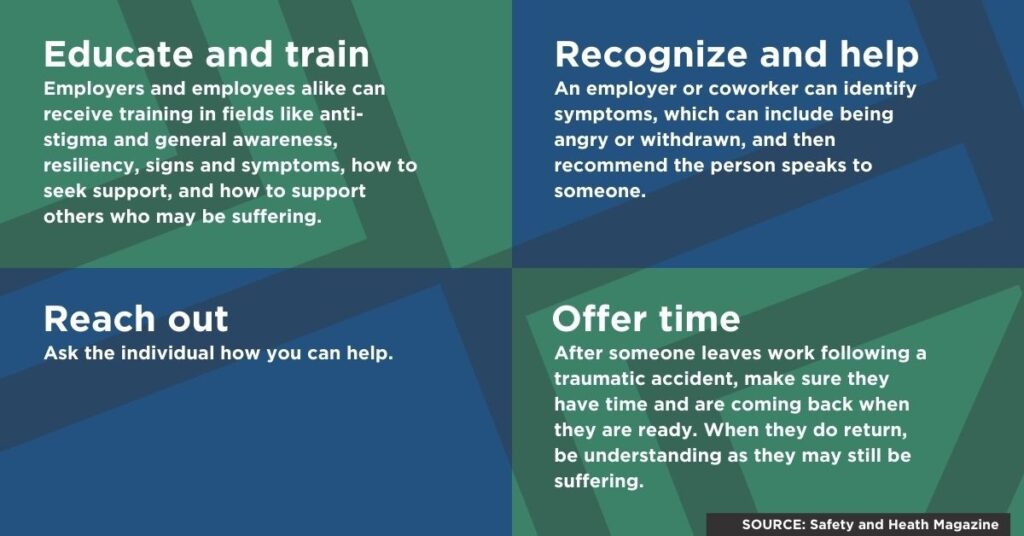

Cuando se piensa en el trastorno de estrés postraumático (TEPT), probablemente se piensa en los veteranos de guerra. Pero ¿sabía que el TEPT puede desencadenarse por un accidente de coche, una agresión física, una lesión laboral, un desastre natural o cualquier otro tipo de acontecimiento traumático?
A menudo oscurecido por depresión, comorbilidades, abuso de sustancias o simplemente falta de comprensión, el TEPT, que se calcula que afecta a alrededor del 6% de los estadounidenses, puede ser difícil de identificar y diagnosticar.
Siga leyendo para obtener más información sobre el tratamiento y la recuperación del TEPT y explorar las opciones de indemnización de los trabajadores y las reclamaciones por lesiones personales relacionadas con el TEPT.
¿QUÉ ES EL TEPT?
El TEPT es un trastorno psiquiátrico que se produce tras un acontecimiento traumático en la vida de una persona. Sobre 50% de personas experimentarán un trauma que podría desembocar en un TEPT en algún momento de su vida.
Los síntomas incluyen flashbacks, pesadillas, ansiedad grave y pensamientos incontrolables sobre el suceso.
>> LO QUE HAY QUE SABER SOBRE SALUD MENTAL
Muchas personas que han pasado por una experiencia aterradora o traumática tienen problemas de adaptación inicial. Pero si se les da tiempo y el apoyo adecuado, la mayoría de las personas pueden reanudar su vida normal sin síntomas a largo plazo. Pero si los síntomas persisten y alguien tiene dificultades para afrontar su experiencia, es posible que padezca TEPT.
Cada persona mostrará síntomas diferentes y se beneficiará de métodos de tratamiento distintos. Asegúrese de buscar ayuda de un profesional y nunca intente tratarse usted mismo sin asesoramiento profesional. Los métodos de tratamiento más comunes son:
- Terapias estructuradas enseña a los pacientes a sustituir los pensamientos y comportamientos negativos por otros positivos, les ayuda a afrontar sus miedos y puede reducir la frecuencia e intensidad de las pesadillas.
- Medicamentos como los antidepresivos SSRI y SNRI
¿CUÁLES SON LAS IDEAS ERRÓNEAS MÁS COMUNES SOBRE EL TPSD?
En Estados Unidos, alrededor de 8 millones personas sufren TEPT. Pero eso no significa que todo el mundo lo sepa. Hay varios aspectos de esta enfermedad que no se comprenden bien.
EL ESTRÉS POSTRAUMÁTICO NO SÓLO AFECTA A LOS VETERANOS
Hay muchos sucesos diferentes que pueden provocar TEPT, pero a menudo se asocia a los miembros del servicio militar con esta afección porque una de las causas más comunes es verse en una situación que pone en peligro la vida.
Sin embargo, El TEPT puede ocurrirle absolutamente a la gente que no sean miembros del servicio militar o veteranos. Cualquier persona que haya sufrido o presenciado violencia o abusos, catástrofes naturales, lesiones catastróficas o una situación que haya puesto en peligro su vida puede desarrollar un TEPT.
Los accidentes de coche son sólo un ejemplo de acontecimiento traumático que puede provocar TEPT. Al reimaginar psicológicamente el accidente de coche, la persona afectada puede negarse a conducir y empezar a sobresaltarse con facilidad.
Los entornos laborales causados por una mala organización y diseño del trabajo, la falta de apoyo de los compañeros y una gestión deficiente pueden provocar altos niveles de estrés e intensificar la situación.


Accidentes laborales (como un accidente de construcción) aumentan el estrés y pueden desembocar en un TEPT. En resumen, dondequiera o cuandoquiera que se produzca un acontecimiento traumático, el TEPT puede afectar a cualquiera.
Los síntomas del TEPT no siempre aparecen inmediatamente después del suceso traumático. Pueden tardar semanas, meses o incluso años para que comiencen los síntomas.
EL TRASTORNO DE ESTRÉS POSTRAUMÁTICO NO SUELE PROVOCAR ESTALLIDOS VIOLENTOS
La violencia es no es un síntoma común del TEPT, aunque es uno de los más conocidos. conceptos erróneos sobre la enfermedad.
"Uno de los mayores mitos que una persona con TEPT es una bomba de relojería a punto de estallar", afirmaDra. Elspeth Cameron RitchieExiste la idea de que todas las personas que padecen TEPT son inestables. Ahora bien, es cierto que las personas con TEPT son propensas a ser irritables, pero el TEPT tiene una amplia gama de síntomas y esta idea de que todo el mundo que tiene TEPT va a explotar es una caracterización errónea."
Es mucho más habitual que una persona que sufre TEPT evite el contacto con otras personas que arremeta contra ellas.
¿QUÉ DEBO SABER SOBRE EL TPSD EN EL LUGAR DE TRABAJO?
El TEPT es una enfermedad mental grave y puede manifestarse en el lugar de trabajo en forma de disminución de la productividad, bajo rendimiento y ausencias más frecuentes. Pero contar con un entorno laboral de apoyo puede marcar la diferencia.
Las adaptaciones para el TEPT serán diferentes para cada persona; algunos empleados pueden necesitar más ayuda que otros. Consideraciones como una cultura de oficina inclusiva, horarios flexibles y pausas de descanso programadas pueden contribuir en gran medida a crear un entorno de apoyo para los empleados con TEPT u otras afecciones. Además, ofrecer estas adaptaciones de forma proactiva crea un entorno en el que los empleados se sienten seguros y capacitados para pedir apoyo adicional si lo necesitan y cuando lo necesiten.
He aquí algunas sugerencias sobre cómo asegurarse de que su oficina es un espacio seguro para las personas con TEPT:


Además de controlar los síntomas en el trabajo, las personas que trabajan en determinados profesiones también tienen un mayor riesgo de desarrollar TEPT debido a entornos de trabajo intensos o estresantes. Algunos ejemplos son los primeros intervinientes, los profesionales médicos y el personal militar.
¿SE PUEDE OBTENER UNA INDEMNIZACIÓN LABORAL POR TRASTORNO DE ESTRÉS POSTRAUMÁTICO?
Hay muchos accidentes laborales que pueden provocar TEPT, pero ¿significa eso que es derecho a compensación de los trabajadores?
Las lesiones que ponen en peligro la vida, la muerte de un compañero, la violencia o el acoso pueden ocurrir en el trabajo, y todo ello puede provocar TEPT. Los Estados tienen leyes diferentes sobre lo que se considera elegible para la compensación de los trabajadores.
En Massachusetts un empleado se titula a la indemnización de los trabajadores si los acontecimientos laborales fueron un factor primario causante de su TEPT.
En Nuevo Hampshire, se necesita un elemento de manifestación física para las reclamaciones de compensación de trabajadores. En New Hampshire también hay excepciones específicas para las lesiones mentales, entre ellas: si la causa es una medida disciplinaria, una evaluación del trabajo, un traslado de puesto, un despido, un descenso de categoría, un despido o cualquier medida similar, tomada de buena fe por el empresario.
New Hampshire tiene otra excepción. Los trabajadores de emergencias y seguridad pública con TEPT no necesitan tener síntomas físicos para ser elegibles.
En Rhode Island, El TEPT cumple los requisitos si está causado o va acompañado de un traumatismo físico identificable. O si está causado por estrés emocional derivado de una situación de mayores dimensiones que la tensión y el estrés emocional cotidianos a los que todos los empleados se enfrentan a diario sin sufrir lesiones mentales graves.
¿SE PUEDE INTERPONER UNA DEMANDA POR DAÑOS PERSONALES POR TRASTORNO DE ESTRÉS POSTRAUMÁTICO?
Daños corporales sean causados por la negligencia, imprudencia o descuido de otro.
No existe una norma escrita que determine cómo se produce un suceso traumático. Si alguien experimentó un evento traumático debido a las acciones intencionales o negligencia de otra persona y que conduce a PTSD, entonces una demanda por lesiones personales podría estar justificada.
KECHES LAW GROUP PUEDE AYUDAR
Los abogados expertos y experimentados de Keches Law Group en compensación laboral y lesiones personales están preparados para ayudarle. Si usted cree que tiene una indemnización por accidente de trabajo reclamación o una daños personales caso relacionado con el TEPT, póngase en contacto con nosotros. Nuestro equipo está aquí para ayudarle.




